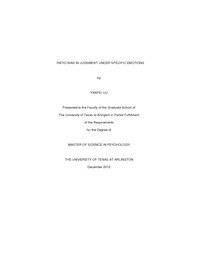
ATTENTION: The works hosted here are being migrated to a new repository that will consolidate resources, improve discoverability, and better show UTA's research impact on the global community. We will update authors as the migration progresses. Please see MavMatrix for more information.
Show simple item record
| dc.contributor.author | Liu, Yanfei | en_US |
| dc.date.accessioned | 2013-03-20T19:13:51Z | |
| dc.date.available | 2013-03-20T19:13:51Z | |
| dc.date.issued | 2013-03-20 | |
| dc.date.submitted | January 2012 | en_US |
| dc.identifier.other | DISS-11992 | en_US |
| dc.identifier.uri | http://hdl.handle.net/10106/11656 | |
| dc.description.abstract | How does specific emotion influence the ratio bias phenomenon? Previous studies suggested that a more systematic and analytical reasoning with logical rationality seemed to be stimulated by negative emotions. However other studies regarding appraisal congruency effects have demonstrated that information processing is dependent on the certainty of emotion. To explore the effect of specific emotions on numeracy and ratio bias in judgment, I conducted a 2 (positive vs. negative emotion) ×2 (certainty vs. uncertainty emotion) between-participants design, contributing to four conditions: happy (positive, certainty), hope (positive, uncertainty), disgust (negative, certainty) and fear (negative, uncertainty). Four groups of participants were induced to experience these four emotions and then completed a binary judgment task to make a choice between two urns containing white and red marbles. The results indicated that people under emotion of certainty (happy and disgust) were higher confident about their judgments and had higher accuracy than people under uncertain feelings (hope and fear). | en_US |
| dc.description.sponsorship | Levine, Daniel S. | en_US |
| dc.language.iso | en | en_US |
| dc.publisher | Psychology | en_US |
| dc.title | Ratio Bias In Judgment Under Specific Emotions | en_US |
| dc.type | M.S. | en_US |
| dc.contributor.committeeChair | Levine, Daniel S. | en_US |
| dc.degree.department | Psychology | en_US |
| dc.degree.discipline | Psychology | en_US |
| dc.degree.grantor | University of Texas at Arlington | en_US |
| dc.degree.level | masters | en_US |
| dc.degree.name | M.S. | en_US |
Files in this item
- Name:
- Liu_uta_2502M_11992.pdf
- Size:
- 457.5Kb
- Format:
- PDF
This item appears in the following Collection(s)
Show simple item record


